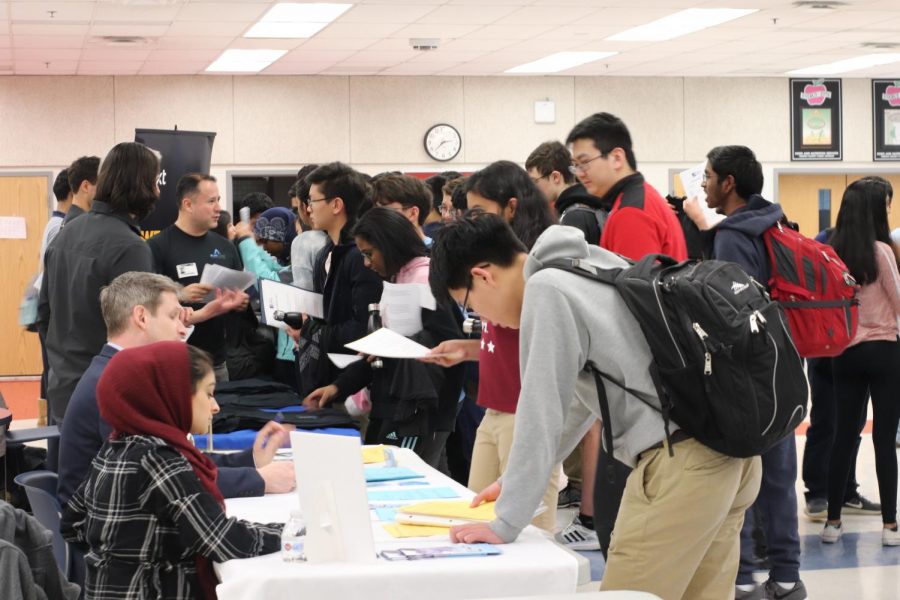Exploring Summer Internship Opportunities
Internship Fair held at Jefferson provides summer internship opportunities
Junior Adam Yao discusses possible summer opportunities with representatives from various companies, such as Yext, during the Internship Fair. The fair is designed to aid students in finding summer opportunities to expand their knowledge and explore their career.
February 20, 2019
Every February, an Internship Fair is held at Jefferson, where various companies showcase their opportunities for students to explore their chosen field of interest. Organized by the College and Career Center (CCC), it is designed to aid students in finding internships in every field – from law to engineering.
This year, it was held on Feb. 15, during A and B Blocks in the cafeteria, and drew many students, mainly sophomores and juniors, who came for various reasons. Several felt that it was a good opportunity to explore possible summer options, and learn more, especially for those who had not done an internship before.
“I have never done an internship before, so I went to the internship fair out of curiosity and because I figured it wouldn’t hurt and I might find an interesting opportunity,” junior Rayna Schoenberger said.
Others, who had chosen a lesser-known field, came to see if there were internships for their field as well. For example, finding internships for electrical engineering are more difficult, in the midst of computer science ones, as was the case for junior Hana Wong.
“When I was looking at what to do in the summer, I wanted to do something that would benefit my learning and my education, as well as for my future STEM career as an electrical engineer,” junior Hana Wong said. “When I looked online, I could only find 1 electrical engineer internship out of 200 computer science internships. So I decided to go to this Internship Fair because I heard that a lot of technology, not just CS, internships were being offered.”
For many students, the most exciting part of the fair was finding internships that they had previously not known about, and learning about them.
“The Internship Fair was really informational, with lots of different companies that I didn’t know were in the NOVA region. For example, there was a military nonprofit,” Wong said. “One that I was interested in was Givology, because it was founded by TJ alumni in 2010 and I thought it was really interesting how they support students around the world by pairing them with donors who support their education.”
For others, they were excited to find lesser-known internships in their field, and expand their horizons.
“I didn’t have a favorite part per se, but I was happy to find a biology-related opportunity (that wasn’t ASSIP-that’s already very well-publicized); things there are almost always business or CS related,” Schoenberger said.
Although many students have not done internships before, some are eager to conduct research and meet others who have similar interests.
“I imagine I’d be excited about the work being done and being able to meet cool people with similar interests/possibly make industry connections,” Schoenberger said.
For other students, the possibility of working with professional mentors and professors is a chance to expand their knowledge of their chosen field.
“I think the most exciting part of an internship is being able to work with mentors, who are really knowledgeable about the field that I’m interested in – electrical engineering,” Wong said. “I feel that by working with college professors and professionals who are actually using it in real-world applications, it would be a great way to expand the boundaries of my knowledge and experience in the electrical engineering field.”
Yet, others feel that the most important part of an internship is being able to embrace the unknown and have motivation to learn more about it and explore the field. An example of an internship that provides this opportunity is George Mason University’s Aspiring Scientists Summer Internship Program (ASSIP).
“ASSIP provides a lengthy, distraction-free, immersion STEM research experience which is a necessary paradigm shift to transform science students who focus on knowing all the right answers, into student scientists who courageously embrace NOT knowing,” GMU Director of Student Research and Internships Dr. Andrea Cobb said.
ASSIP differs from other research internships in that it does not charge fees to participants, and offers research in a wide variety of fields.
“GMU ASSIP is uniquely inclusive in several ways. First, we do not charge participants like many other programs. We also do not pay participants stipends –that allows us to include ten times the number of participants,” Cobb said. “Finally, we offer research from around 20 vastly different types of STEM fields—so that participants can gain perspective on many content areas as well as insight on the benefit of cross-collaboration.”
Through ASSIP, Dr. Cobb hopes to instill a multitude of characteristics within students, to help them continue to research and innovate as tomorrow’s scientists and engineers.
“Awe, humility, respect, courage, perseverance, collaboration, communication, creativity, value of others and self-understanding,” Cobb said. “These characteristics are fostered through the collaborative research that takes place between mentors, and various workshops held throughout the summer to show students the wide possibilities of scientific research and development in every field. Additionally, all projects are showcased at the end of the session, giving each student the opportunity to contribute to the pool of existing scientific knowledge.”
As students are excited to conduct research, Cobb reflects on her experience and the shining moment when students realize they are the first to discover something in their field.
“Science cannot be taught, it must be learned by active pursuit. Only when students pursue the unknown do they “get” science— the rush of being that pioneer who discovers their pieces of the unknown,” Cobb said. “The mentors and I love that moment of that realization which marks the birth of a scientist or engineer.”






